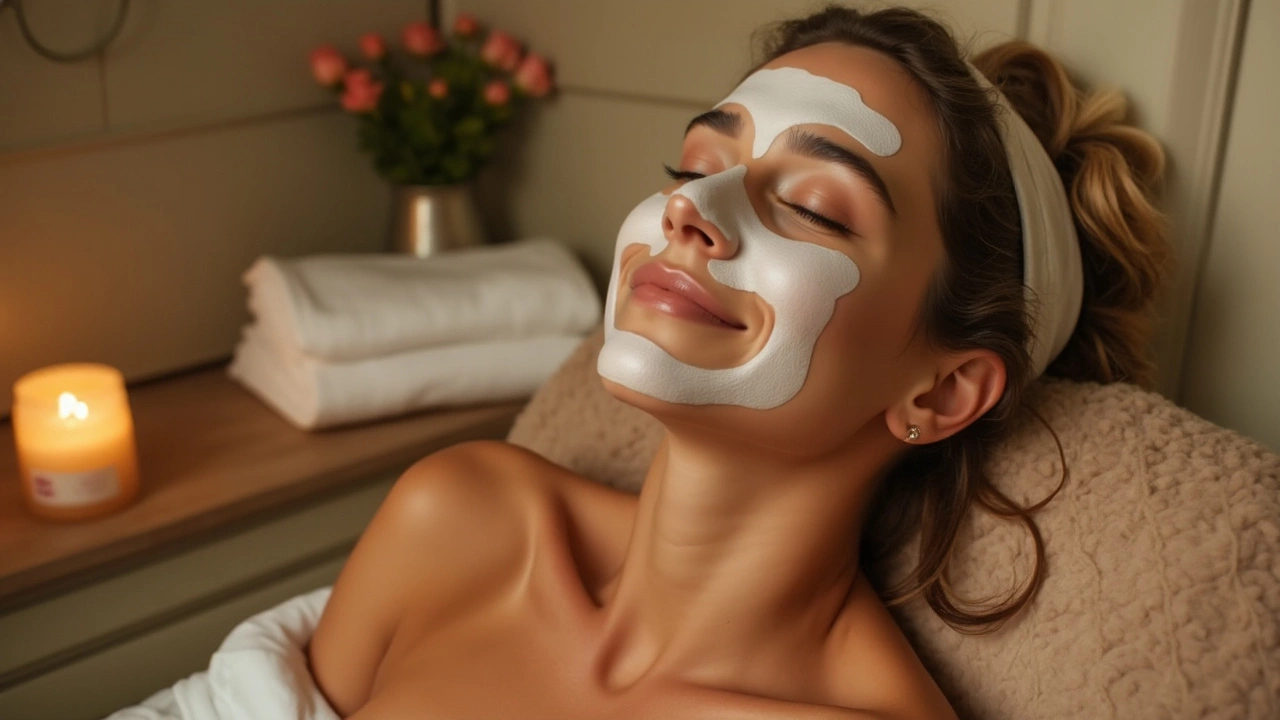Effortless Skincare Routines: Easy Steps to Glowing Skin
 Oct, 23 2024
Oct, 23 2024
In today's world, where we're often short on time but not on skincare options, it's refreshing to know that an effective skincare routine doesn't have to be complicated or time-consuming. Simple is often best, and by focusing on a few core practices, anyone can achieve healthier skin.
Your skin is a mirror reflecting your inner and outer self-care. Caring for it doesn’t necessarily mean spending a fortune; sometimes, less truly is more. By establishing just a handful of essential steps and understanding your skin's needs, you can embrace a skincare routine that fits seamlessly into your life.
Whether you're just starting your skincare journey or looking to simplify an overwhelming array of products, these easy steps can help you cultivate a natural glow. Consider this your guide to skincare essentials, tailored for every unique skin type, to maintain a bright and youthful complexion all year round.
- Understanding Your Skin Type
- The Importance of Cleansing
- Nourishing with Moisturizers
- Sun Protection Basics
- Consistent Skincare Habits
Understanding Your Skin Type
Having a clear understanding of your skin type is the very foundation of any successful skincare routine. It's more than just knowing if your skin is oily or dry; it's about recognizing the unique characteristics and needs of your skin. This knowledge allows you to choose the right products and tailor your skincare steps for the most effective results. Most people fall into one of the following basic categories: oily, dry, combination, or sensitive skin. Each type has its own traits and challenges, which require specific care and consideration.
The skin type you're born with can be influenced by factors such as genetics, environment, diet, and hormones. For those with oily skin, the main concern often lies in controlling excess shine and minimizing the appearance of pores. People with oily skin tend to notice a shiny complexion shortly after cleansing, and blemishes might become a frequent concern. In contrast, those with dry skin might experience a feeling of tightness and flakiness, as the skin struggles to retain moisture. The challenge here is to keep the skin hydrated while avoiding products that could exacerbate the dryness.
Then there are individuals with combination skin, who have both oily and dry areas on their face. Typically, the T-zone (which includes the forehead, nose, and chin) is oily while the cheeks may be dry. This presents a different set of challenges, as these individuals need a skincare routine that addresses both dryness and oiliness at the same time. Sensitive skin, on the other hand, can easily become irritated or inflamed and often reacts to new products or environmental changes. Being gentle and cautious with product selection is crucial for sensitive skin types to avoid triggering adverse reactions or allergies.
Knowing the characteristics of your skin also helps in adapting to the changes that occur with seasons and age. For instance, what might be effective during the humid summer months may not be ideal during the colder, drier winter season. Similarly, as your skin ages, your skin type can change. Younger people, especially teenagers, are more likely to have oily skin, while mature skin often leans towards dryness. This means being open to adjusting your routine as needed.
To accurately determine your skin type, try a simple test at home. After you wash your face with a gentle cleanser, wait for about an hour without applying any products. If your face feels tight, you likely have dry skin. If there's noticeable shine on your cheeks, nose, and forehead, it may be oily. Combination skin usually presents with shine and dryness in different areas. For a more sensitive skin type, test with a couple of new products; if they cause much redness or irritation, this might be your skin’s personality.
"Your skin type isn't static - it evolves with time and circumstances," notes Dr. Samantha Bunting, a renowned dermatologist. "Regularly checking in with how your skin feels and appears is key to ensuring your routine remains effective."
Awareness of your specific skin type is key to successfully navigating the world of skincare products and treatments. It empowers you to select items that will not only treat problems but enhance your skin's natural attributes. Once you decode what category your skin fits into, the journey towards a perfectly tailored skincare routine becomes significantly easier and more fulfilling.
The Importance of Cleansing
The foundation of any effective skincare routine lies in proper cleansing. It's the step that prepares your skin for all subsequent treatments, setting the stage for their success. Cleansing is not just about removing makeup; it involves getting rid of grime, excess oil, and pollutants that your skin collects throughout your day. These impurities, if left unchecked, can lead to clogged pores, dullness, and even breakouts. By cleansing, you give your skin a fresh start, allowing it to breathe and regenerate naturally.
One interesting fact is that our skin renews itself approximately every 28 days. Without daily cleansing, this renewal process can become hindered. Cleansers come in various forms, from gels and creams to balms and micellar waters, each designed to suit different skin types. Choosing the right one for your skin type is crucial. For example, those with oily skin might benefit from a foaming cleanser that helps control oil production, while people with dry skin may need a creamier product that moisturizes as it cleanses.
Proper technique matters just as much as the product itself. Start by wetting your face with lukewarm water, which helps to open up the pores, making it easier to remove impurities. Apply your cleanser and gently massage it in circular motions, focusing on areas where dirt and makeup tend to accumulate, such as the T-zone and around the hairline. Thoroughly rinse your face to ensure no residue is left behind, as this can cause irritation.
"The act of cleansing is the single most important step in preparing your skin," explains Dr. Alexis Granite, a dermatologist known for her straightforward advice. "When done correctly, it sets the foundation for your entire skincare regimen."
Cleansing should be a part of both your morning and evening routines but especially crucial at night. During the day, your skin is exposed to numerous environmental aggressors. Night cleansing ensures these are washed away so your skin can focus on repair and regeneration while you sleep. For those who wear makeup, a double cleansing method is often recommended: a first cleanse to remove makeup and a second to deeply purify the skin.
A common misconception is that it's enough to cleanse just once a day. In reality, nighttime cleansing is vital. Your skin does a lot of work during the night, and going to bed with a clean face means you're giving it the best chance to do so effectively. Reseach by the American Academy of Dermatology shows that individuals who cleanse their face twice daily report healthier-looking skin, reinforcing the value of this simple step. Consistency is key, and integrating cleansing into your daily routine can make all the difference in achieving that glowing skin everyone desires.

Nourishing with Moisturizers
Moisturizers are like a soothing balm for your skin, providing the essential hydration to keep it looking and feeling its best. The science of moisturizers is about maintaining the skin’s natural balance, which can be easily disrupted by environmental factors like weather, pollution, and even stress. Proper moisturizing can delay signs of aging and promote a healthy glow, essential for any skincare routine.
Choosing the right moisturizer is more than just about texture and fragrance. It's an act of understanding your skin’s unique needs. There are various forms—from creams to gels—that cater to different skin types. For example, if you have dry skin, you might require a richer cream that locks in moisture throughout the day. In contrast, if your skin tends to be oily, a lightweight gel can provide the hydration you need without the greasy feel.
It’s crucial to apply moisturizers to slightly damp skin, generally after cleansing, to seal in as much hydration as possible. This routine step helps smooth out the skin surface and prepares it for make-up, if you choose to wear any. Another tip is to use the moisturizer in gentle, upward strokes, promoting blood flow and reducing puffiness. Consistency in these small actions can have a lasting impact on your skin's health.
Understanding the ingredients in your moisturizer can revolutionize how you view skincare. Ingredients like hyaluronic acid, known for holding up to 1000 times its weight in water, can be a game-changer for maintaining skin hydration. Ceramides help restore the skin’s barrier, making them ideal components in various formulas. Looking at your moisture balance through the lens of results and ingredient efficacy can help clarify why specific products stand out.
Customized Skincare
One might wonder if constant innovation in the skincare industry means changing the basics of simple skincare. Dermatologists often highlight that while advancements introduce new products, the core function of a moisturizer—to hydrate and protect—remains constant. They work by creating a barrier that locks in moisture, protecting it from external damage.
"Moisturizers aren’t just for hydration," points out Dr. Elaine Fergusson, a renowned dermatologist. "They are the unsung heroes of any skincare routine, working tirelessly to keep your skin barrier intact."This simple but profound understanding reinforces why moisturizers should be a twice-daily ritual.
Alternatives like natural oils, such as jojoba or almond oil, offer different benefits. Oils can not only provide moisture but also supply the skin with antioxidants and essential fatty acids. Although not replacements for traditional moisturizers, these can be beneficial additions for some individuals dealing with specific skin concerns. Many consider combining oils with traditional moisturizers, creating a personalized approach that can cater to individual needs.
| Skin Type | Suggested Moisturizer | Key Ingredients |
|---|---|---|
| Dry | Cream | Ceramides, Hyaluronic Acid |
| Oily | Gel | Water-based, Aloe Vera |
| Combination | Lotion | Niacinamide, Glycerin |
As skincare continues to evolve, maintaining a focus on simplicity is a tried-and-true strategy in achieving the best results. Consistent attention to moisturizing profoundly influences your skin’s health and beauty. So, whether you're rushing through your morning routine or unwinding before bed, take that extra moment to give your skin the nourishment it craves.
Sun Protection Basics
Let's dive into one of the most crucial steps of any skincare routine: sun protection. The sun, as much as it's beloved for its warmth and light, is the skin's greatest adversary when it comes to premature aging and damage. It's said that up to 80% of skin aging is due to sun exposure, highlighting the critical need for incorporating sun protection into your daily ritual. Without it, even the best skincare products might not be enough to combat the ravages of time and environment. Understanding why and how to protect your skin can make all the difference in preserving your youthful, glowing complexion.
Sun protection revolves around a simple, yet powerful tool: sunscreen. Sunscreen should be generously applied and re-applied throughout the day, especially if you're outdoors for extended periods. Those who might think sunscreen is only for sunny days may want to reconsider. The sun's harmful UVA and UVB rays penetrate through clouds and glass, meaning protection is necessary rain or shine, indoors or out. It’s recommended to use a broad-spectrum sunscreen with an SPF of at least 30, as this provides defense against both types of radiation.
While sunscreen is essential, it's not the only method of protection. Seeking shade, especially during peak hours between 10 a.m. and 4 p.m., can help keep those harmful rays at bay. Wearing hats with wide brims and protective clothing like long sleeves and sunglasses are also effective barriers. Many might be surprised to learn that UV-protective clothing is available, offering an extra layer of safety that's built into the fabric. It’s all about creating barriers and being mindful of how long you’re exposed during those peak sunlight hours.
To understand the importance of sun protection, consider this well-documented quote:
“The sun is the most important cause of skin aging. Protect your skin by applying sunscreen every day.” – Dr. Howard Murad, renowned dermatologist and founder of Murad Skincare.What Dr. Murad points out is not just a suggestion; it's a scientific basis for one of the clearest paths to maintain youthful skin. Regular sun protection is non-negotiable for the longevity of your skin's health and beauty.
Recent studies also suggest that integrating antioxidants with your sun protection routine can enhance its effectiveness. Antioxidants like Vitamin C or E can help neutralize any free radicals produced by sun exposure, offering further protection on a cellular level. This approach combines the physical barrier actions of sunscreen with biochemical defenses, creating a comprehensive shield for your skin. While sunscreen can block a significant percentage of rays, these antioxidants can address what gets through, making your approach to sun care supercharged and proactive.

Consistent Skincare Habits
Building consistent skincare habits is like planting seeds in a garden; with dedication and patience, the rewards are plentiful. The key to this regimen is simplicity. Start by picking a few effective practices rather than trying to follow every trending skincare hack online. This helps prevent overwhelm and keeps your routine sustainable, ensuring that you’ll stick to it in the long run.
Many people underestimate the power of regularity in skincare. Washing your face in the morning and night should become as habitual as brushing your teeth. This consistency helps keep your skin feeling clean and supple. A study published in the Journal of the American Academy of Dermatology has shown that people who maintain a consistent cleansing routine report fewer skin issues like acne and dryness.
It's also essential to remember that your skin responds to changes both internally and externally. Drinking plenty of water maintains hydration, which is as crucial as what you apply topically. Each habit, including those that enhance your inner health, contributes to a resilient and glowing complexion. A balanced diet rich in vitamin E and omega-3 fatty acids can further support your skin’s elasticity and radiance.
For those keen on maintaining their glowing skin, it's wise to keep a skincare calendar, marking any products you try and the results you observe. This can be a practical way to track what works and what doesn’t, essentially creating a customized skincare playbook for yourself. It also encourages you to be mindful about the ingredients you put on your face, helping you avoid any potential irritants.
Technology can be an ally as well. Set reminders on your phone to prompt you for sunscreen application or a nightly hydrated face mask session. Experts often recommend apps specifically dedicated to skincare reminders. According to Dr. Alexis Stephens, a dermatology expert, "Consistency, combined with the right advice and products, determines the success of your skincare journey."
“The secret of your future is hidden in your daily routine.” - Mike Murdock
Lastly, don't forget the emotional component. Skincare routines offer us a moment of mindfulness in our daily lives. Each step, whether it's massaging a serum or a gentle exfoliation, is a chance to connect with yourself. Finding joy in these moments will not only benefit your skin but your well-being too.
